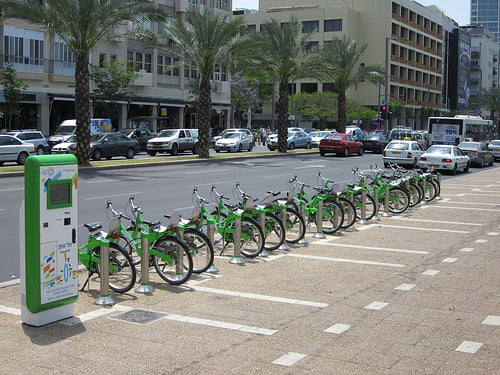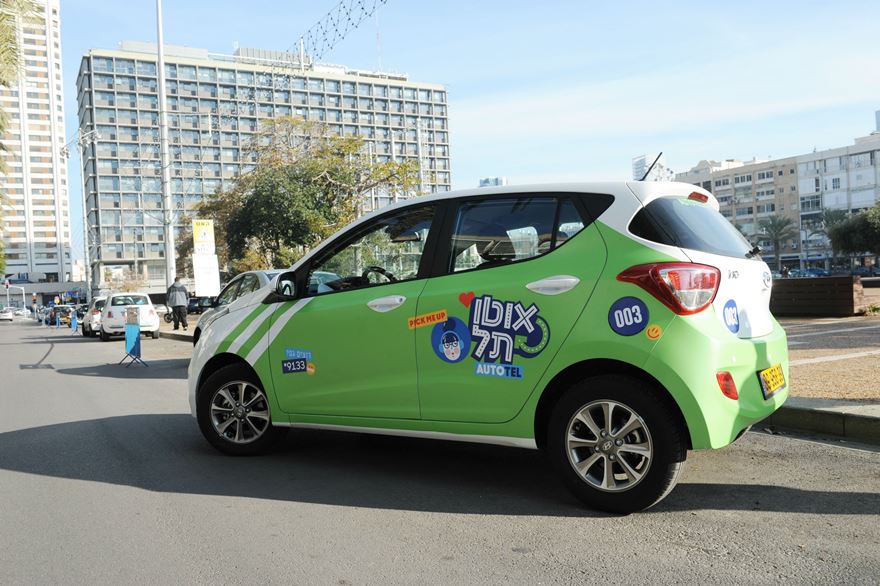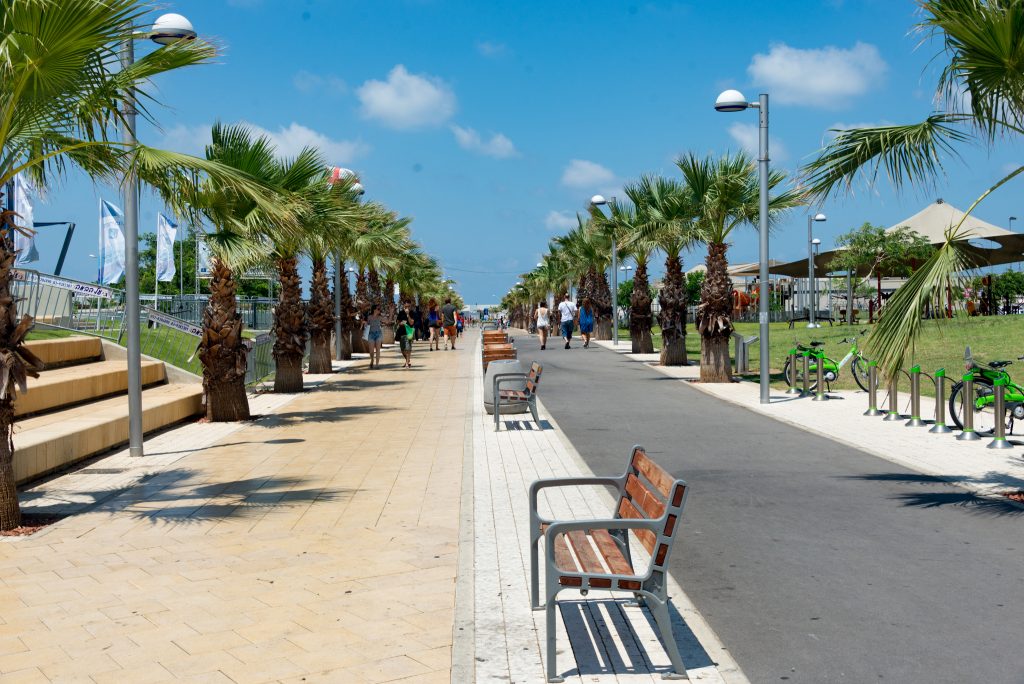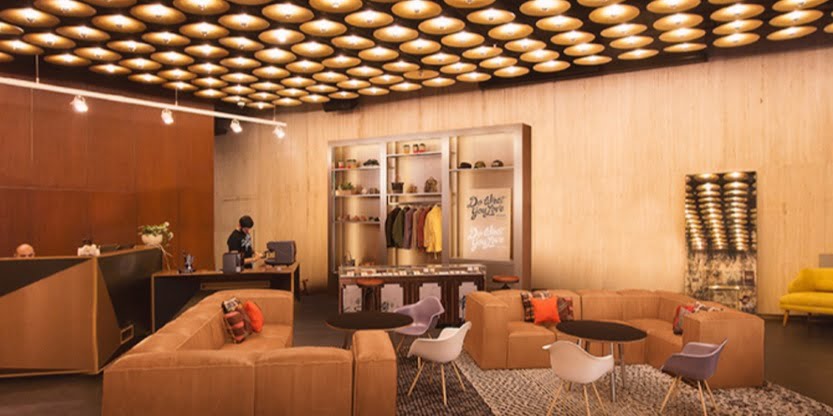Tel Aviv’s entry into the C40 Climate Leadership Group this month has affirmed the cosmopolitan city’s commitment to transform itself into a model of sustainability through an earnest effort to tackle climate issues. The C40 group, which welcomes Tel Aviv alongside 92 other cities across the world, is just one of the many environmental initiatives taking the Mediterranean metropolis by storm, with policies that aim to promote conservation, minimize the carbon footprint, and incorporate a sustainable lifestyle into an urban landscape.
The city of Tel Aviv-Jaffa has been aspiring to identify as a “green city” for more than a decade by delivering a strong number of environmental initiatives. While Environmental Protection Ministry Director Eitan Ben-Ami claims the city has always “had a lot of sustainability initiatives without calling them ‘sustainability,'” he believes the regulations really started rolling out after the election of current Tel Aviv Mayor Ron Huldai, who was first voted into office in 1998. He has since been re-elected three times.
In recent years, the city’s sustainability initiatives have been particularly forthcoming, as it has taken on an urban transformation that focuses on modernity, innovation and international recognition, as well as eco-friendly policies in a big city.
Both the Tel Aviv-Jaffa Municipality and the Environmental Protection Authority in Israel have pushed for further ecological solutions that include urban farming, a massive tree-planting project, taking private cars off the road, and making areas of the city friendlier to pedestrians and cyclists. A throng of healthy and vegan-friendly eateries, as well as ambitious recycling programs, have also popped up.
Where environmental “firsts” are concerned, Tel Aviv-Jaffa is at the top of the list. It is the first Israeli city to join the C40 Climate Leadership Group, representing more than 650 million people worldwide, with the aim of taking action as detailed in the Paris Agreement, an accord within the United Nations Framework Convention on Climate Change that says each country determines, plans and reports its contribution towards the mitigation of global warming.
Tel Aviv also houses Israel’s first commercial urban farm in the center of the city and is the first city in Israel to invest in a citywide shared vehicle fleet, and one of only a handful in the world. It is the Tel Aviv municipality that pioneered the highly popular citywide bicycle-sharing system “Tel-O-Fun,” in 2011.
SEE ALSO: Urban Jungle: Tel Aviv Named World’s 7th Greenest City
There’s still work to be done, however, especially on the recycling front. In theory, Tel Aviv-Jaffa residents want to recycle and municipality officials strive to push protocols for them to do, but the lack of space in the city, as well as unstable, constantly changing government policies, make it difficult on both ends. In August 2017, Haaretz reported that only about 20 percent of Israel’s household trash was actually recycled and that the local authorities were “misleading the public” because they would rather pay fines than spend money on the cost of recycling. The Environmental Protection Authority has also raised suspicions that a regional bottle recycling company had filed false reports, making it hard to verify how much recycling is actually happening in the city.
Pollution is also a problem. Even with efforts to curb transportation-related air pollution and high concentrations of nitrous oxides by implementing car-sharing programs, electric vehicles, and clean walkable paths, Tel Aviv-Jaffa is still one of the most polluted Israeli cities in the country with much higher air quality index ratings (measuring air pollution) than European cities like London and Amsterdam, according to previous reports from the Environmental Protection Agency.

Tel Aviv-Jaffa is the first Israeli city to incorporate the ‘Tel-O-Fun’ bike sharing rental system. Courtesy
Nevertheless, Tel Aviv-Jaffa continues to make great strides to promote itself as an environment-friendly city.
Tel Aviv: The Green City
In the heart of Tel Aviv, an urban farming complex grows organic produce without soil on the roof of the city’s oldest and most central mall, Dizengoff Center. The project, called ‘Green in the City is a joint venture by the urban farm systems company LivinGreen and Dizengoff Center which together established the system spread across 750 square meters of the mall’s roof. The farm grows vegetables such as lettuce, basil, bok choy, onions, tomatoes, and cucumbers using hydroponics, a type of gardening that grows plants using very little nutrient-rich water solutions and without any soil. The produce grown on the rooftop is later distributed to eateries like Cafe Greg and River chains in Tel Aviv.

Dizengoff Center’s rooftop farm produces lettuce, basil, bok choy, and other organic produce through hydroponics. Courtesy
Dizengoff Center’s rooftop farm isn’t the only hydroponics-based system in the city. Over on Rothschild Boulevard (in front of Habima Square,) a new greenhouse was established earlier this month, as part of a movement by the City Improvement Division of the Tel Aviv municipality. The climate-controlled greenhouse grows a variety of edible, decorative, carnivorous, and insect-catching plants as well as fruits vegetables, roots, herbs, and spices, using an advanced hydroponic system. The greenhouse is free and open to the public until March 30, 2018 with tours, workshops, and lectures on offer for all ages throughout the day.
The city is also home to other greenery. According to the municipality, the number of trees in Tel Aviv has doubled in the last decade, reaching 260,000 in total.
“Trees and green areas account for 20 percent of the city’s land,” the Tel Aviv-Jaffa municipality said in a statement earlier this year, as the city was recognized for literally “going green” by ranking 7th in a list compiled by MIT researchers and the World Economic Forum naming the greenest cities in the world.
Tel Aviv’s efforts to “go green” have also found their way into the food industry. In November, the UK’s Independent, crowned Tel Aviv “the vegan capital of the world.”
“With 400 vegan and vegan-friendly kitchens catering to most of Israel’s 200,000 vegans,” the paper wrote, “going meat-free isn’t just easy here; it’s a chance to sample the best food in town.”
Sign up for our free weekly newsletter
SubscribeMany restaurants and cafes in Tel Aviv are known for their organic products and/or their adherence to environmentally-friendly conduct. For the second year in a row, the Tel Aviv-Jaffa municipality has recognized 40 of these businesses by awarding them with a “Green Label” for their efforts to promote an environmentally-friendly culture. Restaurants, cafes, and bistros serving up organic dishes made up a majority of the list, which ran the gamut from Nanuchka’s Georgian vegan hotspot to NOLA American bakery, a cafe known for its coffee and American-style desserts.
Tel Aviv: The Sharing City
While cultivating green in an urban environment is one of the most important aspects of promoting an eco-conscious city, Environmental Protection Authority Director Ben-Ami tells NoCamels that advocating better efficiency in the area is just as important. This could potentially be a difficult task for the densely populated city, where more than 438,000 residents are packed into a 52km space. (That’s about 8,400 people per square kilometer.) The solution, according to Ben-Ami, is the encouragement of a sharing economy, which is ideal for a country that is home to the phenomenon of the collective community, the kibbutz but also the birthplace of the man who founded WeWork, arguably the world’s most successful sharing platform.
WeWork, developed by Israeli co-founder Adam Neumann, aims to create a sharing experience out of office space, and both the concept and company have flourished, boasting 171 locations around the world as of 2017 and a $20 billion valuation. Its new business model, WeLive, aims to do the same for apartments. While the goal of WeLive is to offer a cheaper, more flexible alternative to having your own apartment — it also shares laundry rooms, communal kitchens, roof decks, and hot tubs, which makes it the epitome of the efficient shared experience.”
Ben-Ami says the municipality is already planning to incorporate the WeLive model into the areas of Tel Aviv and Jaffa, in order to give more people the opportunity to live in the Tel Aviv area but also to stimulate the efficiency of a sustainable lifestyle.
Plans are already underway, he says, for a WeLive complex near the Tel Aviv-Savidor railway station on Arlozorov St, though Ben-Ami did not have details on when construction would start on the building. They are also looking to construct a building of this kind in Jaffa.
Tel Aviv-Jaffa is also part of the Sharing Cities Alliance, an organization established in May 2017 to address the growing phenomenon of the sharing economy and is the first city in Israel to introduce the citywide bicycle-sharing and car-sharing programs. The bike-sharing program “Tel-O-Fun”, launched in April 2011. These eco-friendly bikes help avoid city traffic, but also minimize greenhouse gas emissions, and reduce air pollution.

Tel Aviv’s $26 million car-sharing service, AutoTel, is revolutionizing the transportation industry. Photo by Kfir Sivan
AutoTel is the $26 million car-sharing initiative that has already begun in Tel Aviv. Since July, the city has distributed 170 vehicles and allocated at least 340 parking spaces throughout Tel Aviv for drivers using the service. Subscribers can book a car 15 minutes in advance through a special booking app and are able to park their designated Hyundai i10 on specific reserved spots or any regular ones with blue and white stripes in Tel Aviv. The cost of a monthly subscription is a 40nis (about $12) / month flat fee plus usage cost per minute. AutoTel is operated by Israel’s Car2Go rental car service. Car2Go’s CEO Gil Laser told reporters at a press conference at the launch of the service that Tel Aviv was “in the midst of a transportation revolution.”
Tel Aviv: The Recycling City
For a city that is apt to hone in on the sharing concept, one might wonder why this idea hasn’t been applied to the recycling trend. Ben-Ami says the municipality and the Environmental Protection Authority are working on a number of solutions, with talk of multi-purpose bins for different kinds of recyclables. Ben-Ami explains the problem also lies in the lack of available space in the city. Areas in central and south Tel Aviv, where streets are more narrow, are particularly problematic for the placement of bins, he says, and both the municipality and the Environmental Protection Authority are looking for ways to solve that problem.
SEE ALSO: Earth Day 2017: New Recycling Plant Is Turning Tel Aviv’s Garbage Into Fuel
Nevertheless, the city has invested about $20 million shekels in recycling, Ben-Ami says, and authorities are also looking to eventually employ areas for recycling glass, fabrics, and even glass.
“I know people want to recycle and make every effort,” Ben-Ami tells NoCamels.

This cutting-edge recycling plant provides the fuel needed to power the Nesher cement factory in Israel. Courtesy
One of the country’s best solutions for the Tel Aviv area so far, he says, has been the $110 million cutting-edge recycling plant that treats 1,500 tons of household waste every day, about 50 percent of Greater Tel Aviv’s garbage. The plant, Israel’s biggest and one of the largest of its kind in the world, converts the trash into fossil fuel and is part of Israel’s Ariel Sharon Park, built at the location of the large Hiriya landfill. The companies leading this eco-friendly project are Nesher Israel Cement Enterprises, Veridis Environment, and the Hiriya Recycling Park.
As NoCamels reported earlier this year, the landfill “underwent a massive makeover three years ago, which turned a giant mountain of garbage into a 2,000-acre ecological park three times the size of New York City’s Central Park.”
Related posts

Resilient And Nutritious New Plant-Based Milk Aims To Make A Splash

Chocolate From Cultivated Cocoa Comes Without Environmental Toll

Plastic Fantastic: Startup Takes PVC Back To Its Crude Oil Roots







Facebook comments